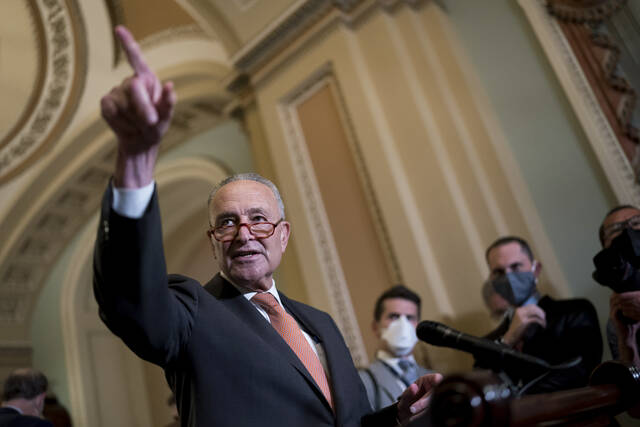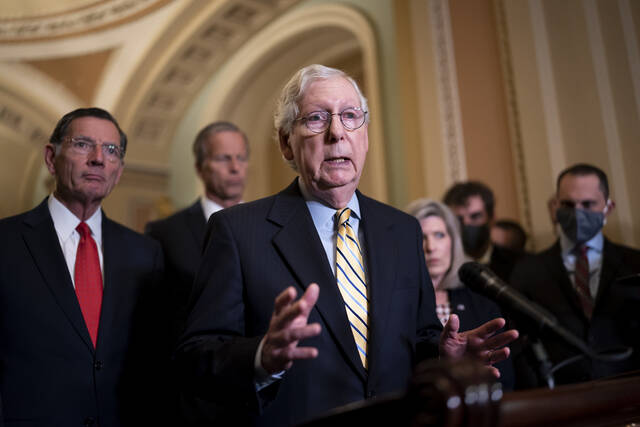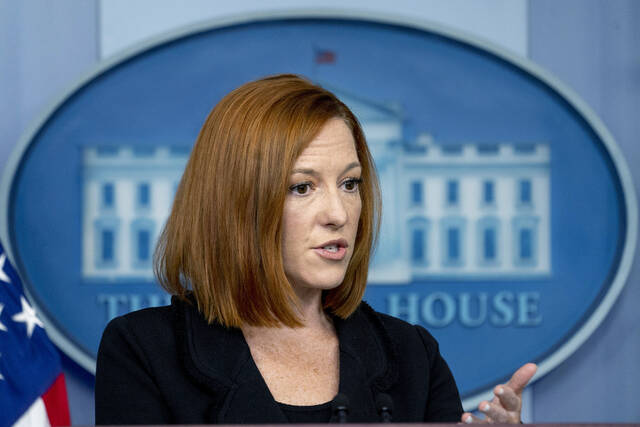


The Associated Press
WASHINGTON — The House rushed headlong Tuesday into a vote on legislation to fund the government, suspend the federal debt limit and provide disaster and refugee aid, forcing a showdown with Republicans who oppose the package despite the risk of a fiscal crisis.
The federal government faces a shutdown if funding stops at the Sept. 30 end of the fiscal year, midnight next Thursday. At the same time, the U.S. risks defaulting on its accumulated debt load if its borrowing limits are not waived or adjusted.
The package unveiled Tuesday would provide stopgap money to keep the government funded to Dec. 3 and extend borrowing authority through the end of 2022. It includes $28.6 billion in disaster relief for the aftermath of Hurricane Ida and other extreme weather events, and $6.3 billion to support Afghanistan evacuees in the fallout from the end of the 20-year war.
“It is critical that Congress swiftly pass this legislation,” said Rep. Rosa DeLauro, D-Conn., chairwoman of the Appropriations Committee, in a statement. The vote was expected Tuesday evening.
Backed by the White House, Democratic congressional leaders pushed ahead at a time of great uncertainty in Congress. With lawmakers already chiseling away at the $3.5 trillion price tag of President Joe Biden’s broad “build back better” agenda, immediate attention focused on the upcoming deadlines to avert deeper problems if votes to shore up government funding fail.
Senate Republican leader Mitch McConnell said he was not about to help pay off past debts when Biden was about to pile on more with a “reckless” tax and spending package. He said since Democrats control the White House and Congress, it’s their problem to find the votes.
“The debt ceiling will be raised as it always should be, but it will be raised by the Democrats,” McConnell said.
Even if Tuesday’s vote is approved by the House, which Democrats control, it is expected to languish in the 50-50 Senate where Democrats will be hard-pressed to find 10 Republicans to reach the 60-vote threshold needed to overcome a filibuster.
The Treasury Department warned that it will soon run out of cash on hand, and have to rely on incoming receipts to pay its obligations, now at $28.4 trillion. That could force the Treasury to delay or miss payments, a devastating situation.
Mark Zandi, the chief economist at Moody’s Analytics, warned if lawmakers allow a federal debt default “this economic scenario is cataclysmic.”
In a report being circulated by Democrats, Zandi warned that a potential downturn from government funding cutbacks would cost 6 million jobs and stock market losses would wipe out $15 trillion of household wealth.
Once a routine matter, raising the debt ceiling has become a political weapon of choice for Republicans in Washington ever since the 2011 arrival of tea party lawmakers who refused to allow the increase. At the time, they argued against more spending and the standoff triggered a fiscal crisis.
Echoing that strategy, McConnell is refusing to provide Republican votes, even though he also relied on Democratic votes help raise the debt ceiling when his party had the majority. He explained his current thinking to senators during a private lunch Tuesday.
Still, some GOP senators might have a tough time voting no.
Republican John Kennedy of Louisiana, whose state was battered by the hurricane and who is up for election next year, said he will likely vote for the increase. “My people desperately need the help,” he said.
